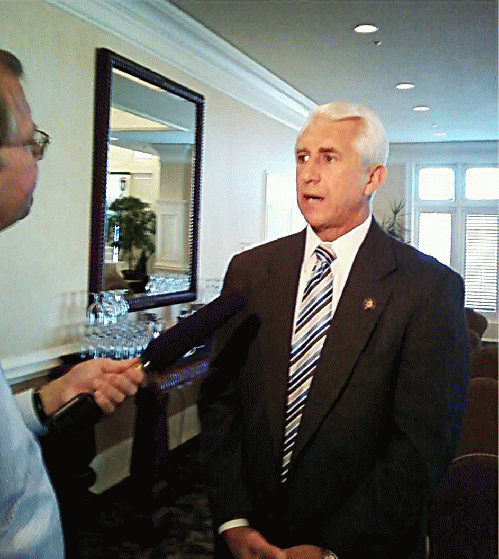Reichert gave a meandering speech that contained few specifics. At the end of his speech, the moderator asked for questions from the floor. A woman asked Reichert to describe his position on whether the Glass-Steagall Act should be reinstated. Reichert said he's not familiar with the act.
Question: "I agree with you that over-regulation is not a good thing, but do you think that they should reinstate The Glass-Steagall Act and at least separate the banks' ability to gamble with our money?"
Reichert: "Well, the Glass-Steagall Act is one that I'm not familiar with. I'm sorry I have to go back and look at that, but I do agree it's something that we haven't dealt with on the House side in committees that I've had, so I'd be happy to look at that and come back and give you an answer on that." [ Newcastle Chamber, 10-16-2010 ]
Here's a video of Reichert's blunder: What's the Glass-Steagall?]
For a US Congressman to be ignorant of this important legislation is surprising. The Glass-Steagall Act of 1933 established the FDIC and introduced banking reforms intended to control speculation. See this wikipedia article for details. Many people blame the subprime crash on the repeal of Glass-Steagall.
It's even more surprising since the issue came up in the Seattle Times' endorsement of Reichert's opponent, Suzan DelBene. Here's an excerpt from the Times' endorsement: "She would have gone further to reform Wall Street, including reviving the Glass-Steagall Act -- the Depression-era legislation that once kept commercial lending separate from investment activities. DelBene seems to grasp the urgency to simplify and reinvigorate government oversight."
Congressman Reichert is a third term Republican representative in Washington's 8th Congressional District, which runs to the south and east of Seattle.
Like most other Republicans, Reichert opposed the Democrats' Wall Street reform bill. See Wall Street reform: Vital to Main Street . During the forum, Reichert justified his opposition to the Democrats' financial reform bill by saying that it would have forced the taxpayers to bailout large firms. (From what I've heard, that completely distorts the facts.)
Near the beginning of his speech, Reichert mentioned that he's reading a book which blamed the Bush tax cuts for contributing to the recession. Reichert said it's surprising to hear a Republican like him say it, but he agreed that the tax cuts were unfair. Still, later in his speech he complained about high taxes and over-regulation.
That's all the Republicans can run on: lower taxes and reduced government regulation -- despite reckless deregulation and tax cutting leading to the subprime crash, the BP disaster, and deficits. Republicans can no longer run on the slogan "Fight Terrorism" (since Obama has stolen that slogan -- lol). And gay-bashing is getting tiresome. Republicans are just the Party of No.
There were several reporters and TV cameras in the room, so it will be interesting to see whether Reichert faces embarrassment for his ignorance about Glass-Steagall.
Reichert's Democratic opponent for the 8th Congressional seat is Suzan DelBene, an ex-Microsoft executive and a successful businesswoman. The northern part of the 8th Congressional district is affluent but increasingly liberal. The south side of Seattle is less affluent and more conservative.
Another interesting issue that came up at the candidates' forum, which was held on Saturday, Oct 16, was I-1098, Washington State's ballot initiative to establish a state income tax. Republican challengers Peter Dunbar and Steve Litzow both admitted that Washington's tax system is regressive and needs to be fixed but they said that I-1098, which will establish a high-earners' income tax on the top 1.2% of Washingtonians, isn't the right approach. (Dunbar made his admission at a separate candidates' forum earlier in the week.)
Several of the politicians listed their reasons for opposing I-1098: allegedly it would prevent job growth during the recession, it would harm small businesses, it's unfair to force the rich to pay for others, and the reform doesn't go far enough. But if they admit that the current system is regressive and unfair, then there's no escape from soaking the rich, who've enjoyed years of preferential treatment and increasing wealth. And there's little evidence that progressive taxes cause job losses. Finally, I-1098 lowers taxes on most small businesses and on 99% of the people.
(Note: You can view every article as one long page if you sign up as an Advocate Member, or higher).






